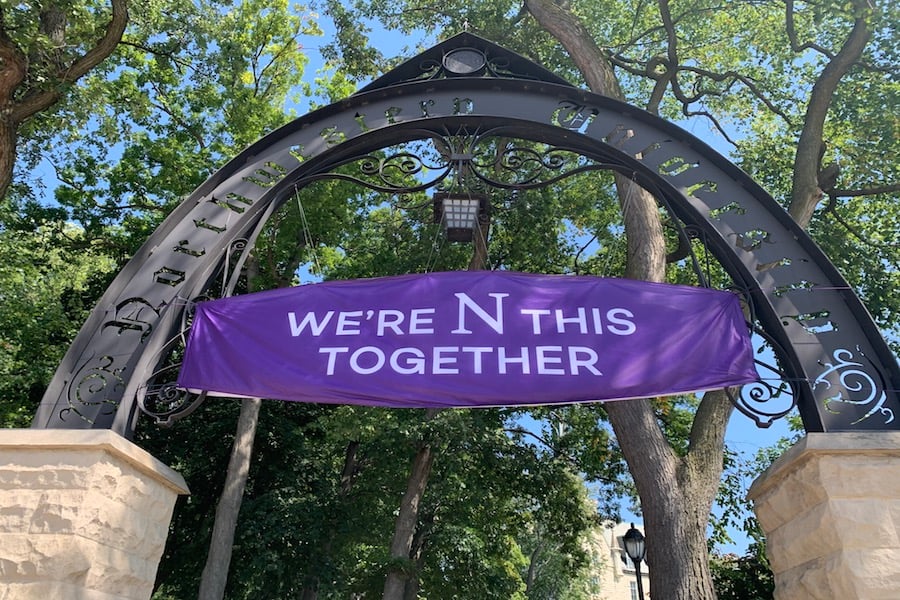NU scientists launch COVID-19 antibody study in Cook County
Daily file photo by Isabelle Sarraf
The Weber Arch. Northwestern announced academic calendar updates and planning for the winter in a Friday email.
October 1, 2020
Anthropology Prof. Thomas McDade, director of the Laboratory for Human Biology Research, is no stranger to antibody testing.
His lab routinely develops antibody tests and has used dried blood spot samples — a method of collecting blood through a finger prick — for over 15 years. In April, as the COVID-19 pandemic swept through the country, McDade realized the work he was doing in his lab could be applied to the challenges the medical community was facing with coronavirus antibody testing.
“Some early antibody tests were inaccurate and had high rates of false positives, and for others to be done, people had to come into hospitals, which were overwhelmed,” McDade said. “Dried blood spot methods could solve both of these problems.”
While he created a new antibody test for SARS-CoV-2, the virus that causes COVID-19, his colleagues at the Feinberg School of Medicine were also developing one using serum, or blood plasma samples. They decided to collaborate and founded Screening for Coronavirus Antibodies in Neighborhoods (SCAN), launching the study in mid-June.
“We found that the results from serum perfectly mirrored those from the blood spots,” said Feinberg Prof. Alexis Demonbreun in a news release.
McDade, the principal investigator of SCAN, said the study’s purpose is to analyze who is exposed to COVID-19, what predicts transmission and why. SCAN also seeks to address why there are inequities in Chicago around who is getting sick, having the most serious COVID cases and dying, McDade said.
People can express interest in participating in SCAN by filling out a form online. McDade said not everyone is chosen to participate, however.
“We can’t test everyone who wants to be tested due to limited resources,” McDade said. “We can, however, limit enrollment to ensure that we get a representative sample of Cook County, so people of all ages, genders, races, ethnicities and so on.”
After people are chosen to participate in SCAN, a collection kit is sent to their home. Participants prick their finger and a single drop of blood is stored on special filter paper where it dries, according to the release. The samples are then sent to a lab, where McDade said coronavirus antibodies are quantified with high levels of precision.
Different research centers across Northwestern are affiliated with SCAN, including the Institute for Sexual and Gender Minority Health and Wellbeing. Rana Saber, director of research application design and development for the Institute, assists with the logistical aspects of randomly selecting SCAN’s participants and sending people their test kits.
Saber said one of SCAN’s strengths is its accessibility. Participants collect a blood sample in their homes, which she said is relatively painless, and don’t have to go to a medical clinic to get tested. Since kits are sent to participants, she said little effort is required overall.
“This type of at-home antibody testing has been really beneficial for folks,” Saber said. “People have been vocal about how appreciative they are to be a part of this study.”
SCAN originally received funding to test 1,000 people in 10 Chicago neighborhoods, McDade said. It has since expanded to 3,000 across all zip codes in Cook County. With additional funding, he said he could see the study testing around 5,000 people overall. SCAN is also now researching immunity, and hopes to understand immunity based on prior exposure to COVID-19, as well as how that might impact risk for future infection.
Over the next few months, SCAN will analyze data as it receives more samples from its subject pool. The plan is to report results through papers published on the SCAN website and in various journals. McDade and other investigators already released one report in a paper on medRxiv, the preprint server for health sciences, according to the news release.
As SCAN grows, Saber said what researchers are learning about COVID-19 is constantly evolving. She said much is still unknown about the coronavirus, so overtime, the questions SCAN seeks to answer will change, too.
“It’s a beast that keeps growing, which is fantastic,” Saber said. “That’s exactly what we want to happen to gain as much knowledge as possible.”
Email: zoemalin2022@u.northwestern.edu
Twitter: @zoermalin
Related stories:
— NU scientists develop new antibody test for COVID-19
— Dr. Steven Thrasher talks protests, coronavirus and policing



